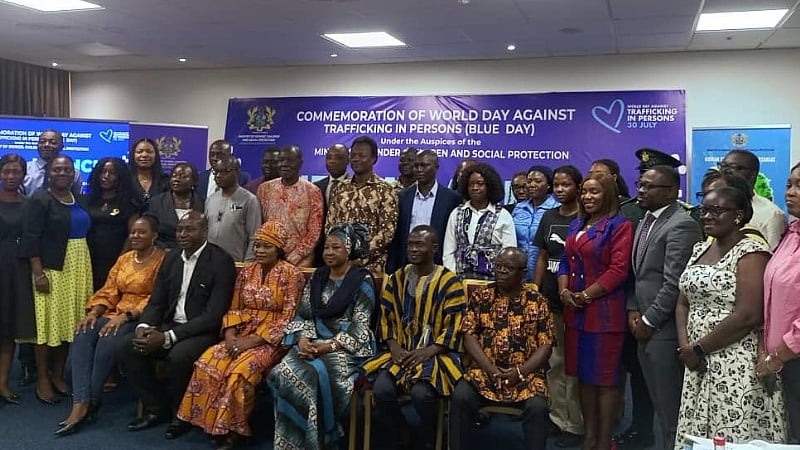Ghana’s Two-Decade Fight Against Human Trafficking: A Retrospective on Progress and Challenges
Ghana joined the global community in observing World Day Against Trafficking in Persons, also known as "Blue Day," on June 24, 2025. This year’s commemoration held special significance as it marked the 20th anniversary of Ghana’s Human Trafficking Act (Act 694). Themed "The Human Trafficking Law @20: The Journey So Far in Ghana," the event provided a platform for reflection on the nation’s progress, persistent challenges, and the ongoing fight against this pervasive crime. Held at the Accra City Hotel, the high-level luncheon brought together a diverse assembly of stakeholders, including policymakers, civil society organizations, academics, journalists, and advocates, all united in their commitment to eradicating human trafficking. The event underscored the need for collaborative efforts and sustained momentum to combat this modern form of slavery.
Dr. Afisah Zakariah, Chief Director of the Ministry of Gender, Children and Social Protection, delivered the keynote address on behalf of the Minister. She emphasized the insidious nature of human trafficking, highlighting that it not only transcends national borders but also occurs within communities, homes, and informal sectors. Dr. Zakariah underscored the importance of education, legislation, and widespread awareness campaigns to combat this crime. She particularly appealed to journalists and the Ghana Journalists Association to amplify their efforts in reporting trafficking cases, recognizing their critical role in shaping public discourse and holding perpetrators accountable. Dr. Zakariah acknowledged that the fight against trafficking requires a collective effort and cannot be won by government intervention alone.
Professor Leander Kandilige of the University of Ghana’s Centre for Migration Studies echoed Dr. Zakariah’s sentiments, commending the progress made over the past two decades. He highlighted significant achievements, including the establishment of shelters and support services for trafficking survivors, such as the Aflao shelter, supported by the European Union and the French government, and the Madina Children’s Shelter. Professor Kandilige emphasized the inclusion of round-the-clock mental health professionals at these facilities, recognizing the profound psychological trauma experienced by victims. He stressed the importance of sustained vigilance and continued momentum in the fight against human trafficking, emphasizing that these shelters and support systems serve as tangible evidence of positive change.
Hon. Helen Ntoso, Chairperson of the Parliamentary Select Committee on Gender, addressed the audience, highlighting Parliament’s role in overseeing and strengthening legislation related to human trafficking. She underscored Parliament’s commitment to supporting the Ministry of Gender and other stakeholders through oversight, budgetary allocations, and by keeping the issue at the forefront of the national agenda. Hon. Ntoso acknowledged that while significant strides have been made, further efforts are required, particularly in resourcing law enforcement and providing comprehensive rehabilitation services for victims. Her remarks reiterated the importance of a multi-faceted approach involving legislative action, resource allocation, and ongoing public awareness campaigns.
The two-decades since the enactment of Ghana’s Human Trafficking Act have witnessed notable advancements in combating this crime. The establishment of specialized shelters providing comprehensive care and support to survivors is a testament to the nation’s dedication to victim rehabilitation. The inclusion of mental health professionals in these facilities reflects a growing understanding of the profound psychological impact of trafficking and the importance of addressing the trauma experienced by survivors. Increased collaboration between government agencies, civil society organizations, and international partners has strengthened the nation’s capacity to identify, prosecute, and prevent trafficking activities.
Despite these achievements, challenges persist. The need for increased resources for law enforcement and victim support services remains a critical concern. Continued public awareness campaigns are crucial to educate communities about the insidious nature of trafficking and empower individuals to identify and report suspected cases. Strengthening international cooperation to address cross-border trafficking networks is vital to disrupting the global trade in human beings. The commemoration of the 20th anniversary of the Human Trafficking Act served as a timely reminder of the ongoing need for vigilance, collaboration, and sustained commitment to eradicate this pervasive crime. The collective message resonating throughout the event reinforced the critical role of national commitment, media engagement, and grassroots awareness in achieving a future free from human trafficking.


